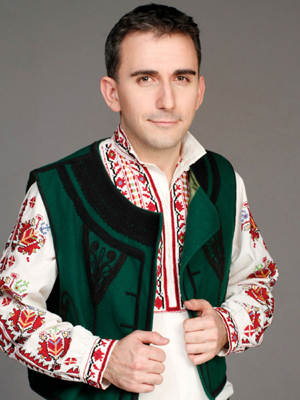Hristo Kosashki recently made new recordings for the Bulgarian National Radio archives and one of them is Kakvo mi se chue djanam (What do I hear, darling). Some of his songs come from the repertoire of great folk singer Boris Mashalov, an idol of Hristo.
„I feel best when I sing music from my home region. I am happy I sing the beautiful northern songs”, Hristo says and adds:
 „I was born in the town of Lukovit, a beautiful place with many songs. I have been keen on music since very early age and my love for folk songs has grown with time. I have sung in different choirs. I finished secondary school in the town of Teteven in a class that offered intensive music training. My teachers strongly recommended to me to study the repertoire of Boris Mashalov. They most probably saw a potential in me to sing his songs and I continue singing them. Well, I am not trying to copy him, he was a great singer. But I am close to him in terms of timbre and temperament. In every appearance I make I perform some of his songs. A key moment in my bio is my tuition at the South-Western University in Blagoevgrad. While I was a student there I was singing at the Pirin Ensemble. I learned the specific style of the Pirin region. Prof. Kiril Stefanov entrusted to me solo parts. This was a very useful experience.”
„I was born in the town of Lukovit, a beautiful place with many songs. I have been keen on music since very early age and my love for folk songs has grown with time. I have sung in different choirs. I finished secondary school in the town of Teteven in a class that offered intensive music training. My teachers strongly recommended to me to study the repertoire of Boris Mashalov. They most probably saw a potential in me to sing his songs and I continue singing them. Well, I am not trying to copy him, he was a great singer. But I am close to him in terms of timbre and temperament. In every appearance I make I perform some of his songs. A key moment in my bio is my tuition at the South-Western University in Blagoevgrad. While I was a student there I was singing at the Pirin Ensemble. I learned the specific style of the Pirin region. Prof. Kiril Stefanov entrusted to me solo parts. This was a very useful experience.”
Let us specify that the songs recorded at the BNR come from the Northern folklore region of Bulgaria, more notably from the region of Lukovit and Teteven. More details from the singer:
„I should like to mention first and foremost the name of Angel Dobrev, the man who arranged the dongs for the BNR Folk Music Orchestra whose soloist he is. Angel also suggested to include one of the songs, Ya doydi libe. I heard it for the first time from him. Two of the titles come from the Teteven area - Kukuvitsa kuka / Cuckoo cuckooing and Kakvo mi se chue djanam (What do I hear, darling). These date back to the National Revival (19 c.) when Bulgarians waged national-liberation struggles. I also recorded a joking song, Mesila baba, gotvila / Granny made bread, cooked food/. It is funny and humorous and tells the story of an old woman who wanted to get younger again and be fancied by young men."
English Daniela Konstantinova
Photo: private library
The audio file contains the following songs performed by singer Hristo Kosashki
1. Radka platno tache / Radka bleaching cloth
2. Kakvo mi se chue, djanam / What do I hear, darling
3. Kukuvitsa kuka / Cuckoo cuckooing
4. Mesila baba, gotvila / Granny made bread, cooked food
5. Ya doydi, libe / Come to me, sweetheart
The historic town of Tryavna will celebrate St Lazarus' Day, traditionally held on the Saturday before Palm Sunday. The Bulgarian custom, known as lazaruvane , is closely linked to the themes of love and marriage and will be re-enacted this..
The feast of the Annunciation (Blagoveshtenie in Bulgaria) is a holy day , a symbol of God’s infinite mercy to people and especially to women, blessed to bear new life, but also an embodiment of the eternal human longing for something better in the..
Clocks and bells will ring out in the center of Stara Zagora on Saturday, when the city will host the XXIV Masquerade Games Festival . The event will start with a traditional parade of participants. Attractive babugers, araps, old men and other..

+359 2 9336 661
